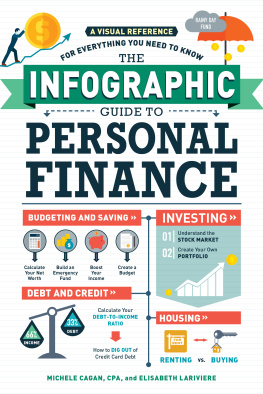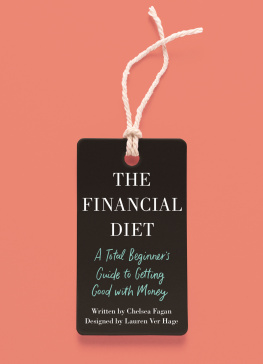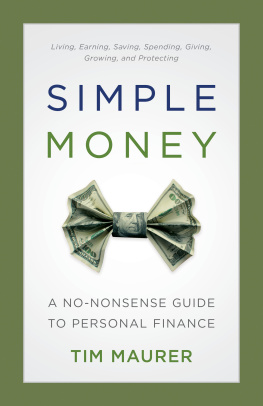Praise forStop Over-Thinking Your Money!
Preet is one of the best. He out and out gets it. Hes truly passionate about helping Canadians handle their money wisely. As important, he has the knowledge and communication skills to do it.
David Chilton, author of the bestselling books The Wealthy Barber and The Wealthy Barber Returns, and the new Dragon on CBCs The Dragons Den
We all know that despite our best-laid plans, crap happens! Preet wants you to know how to protect yourself so that when it does, you have options. This book has a simple, straightforward message about building a strong personal foundation instead of the sexy investment stuff no one can ever put into practice because they dont have the money to take it to that next level. Five simple rules. Thats all. Follow them.
Gail Vaz-Oxlade, TV host and bestselling author of Money Rules and Debt-Free Forever
Managing money isnt hard. But you can be confused, or paralyzed, by all the conflicting information. Preet Banerjee helps you sort through the spin and find the truth about keeping your finances on track. He acts as a trusted friend who talks in terms you can understand without talking down to you.
Ellen Roseman, personal finance columnist, Toronto Star
Just the totally in-your-face talking-to that Canadians need to improve their financial health. Stop making excuses and read this no-nonsense book.
Rob Carrick, personal finance columnist, The Globe and Mail
Banerjee focuses on five basic principles of personal finance that will benefit not just the average financial illiterate but even supposedly sophisticated investors who are guilty of over-thinking their portfolios. In other words, when it comes to money, most of us need to learn to walk before trying to run.
Jonathan Chevreau, editor of MoneySense and author of Findependence Day
[Contains] simple, straightforward advice that you can use immediately and will benefit you for a lifetime. Preet has extracted the complexity from finances, and we are left with a usable tome that can change lives. Well done, Preet.
Tom Hamza, president, Investor Education Fund
PORTFOLIO PENGUIN
STOP OVER-THINKING YOUR MONEY!
PREET BANERJEE inspires others to become financially empowered with his unique ability to take the complexity out of money matters. He writes a personal finance column for The Globe and Mail and is the money expert for the W Network, the host of Million Dollar Neighborhood on the Oprah Winfrey Network (Canada), and a financial panelist on CBCs The National with Peter Mansbridge.
His blog, WhereDoesAllMyMoneyGo.com, was voted Canadas best investing blog, and Advisor.ca named him one of Canadas Top 10 Financial Visionaries. Banerjee also hosts a podcast on iTunes, Mostly Money, Mostly Canadian, which is one of the highest rated podcasts in Canada for business and investing.
He is a fellow of the Canadian Securities Institute (FCSI) and also holds the designations of derivatives market specialist (DMS) and finance management advisor (FMA). He was awarded first place in the 2012 Portfolio Management Association of Canadas Excellence in Investment Journalism Awards.
His website is located at www.preetbanerjee.com.Follow him on Twitter @preetbanerjee.

THIS BOOK IS DEDICATED TO MY WONDERFUL MOTHER,
PARTLY BECAUSE SHE THREATENED ME,
BUT MOSTLY BECAUSE SHE IS THE WARMEST,
MOST LOVING PERSON I KNOW. I LOVE YOU, MOM!
CONTENTS
INTRODUCTION
There are thousands of books on personal finance, investing, debt management, and everything else there is to know about money. You would have to become a full-time reader in order to get through even half of it in your lifetime. The good news is that you dont have to do that to be financially successful. Not even close.
I want this book to make it clear that in order to be in control of your money, you just have to get the fundamentals down pat. And forget what you think you know about the fundamentals, or even what those fundamentals are. Lets start with a tabula rasa, a blank slate, and go from there.
Here are the five simple rules for personal financial success:
Disaster-proof your life.
Spend less than you earn.
Aggressively pay down high-interest debt.
Read the fine print.
Delay consumption.
I guarantee that if you can follow these five rules, youll be better off than most people.
Cue the whimpering party favour that sounds like a dying duck. Yep! On practically the first page Ive given you all you need to know about the fundamentals of being financially successful. Maybe it seems like a letdown. Maybe you were expecting some secret, magic-bullet solution to all your financial problems and questions. That doesnt exist. The truth is, youve either been over-thinking your money, or you havent been thinking about it at all. And its time for that to stop.
Consider the goal of leading a healthier life. We know that if we eat better and work out regularly, well be in better shape. We also know that people who use personal trainers often get fantastic results. But its not because the personal trainer shows you a fancy new way to do a sit-up; the trainer just makes you do the sit-up. When you make an appointment to meet your trainer at the gym, youre more likely to show up than if you were going to work out by yourself. And he or she kicks your butt when you get there. If you can do 10 push-ups without breaking a sweat, thats not a workout, thats a warm-up. Your trainer wont let you stop until youre sweating, and you know that because of that discipline, you are going to see results.
But I have good news.
Getting physically fit is much harder than getting financially fit. Physically, you have to bust your ass forever to see continual improvement. Very few people have the commitment to do that. Financially, you need that kind of discipline for only a short time, because once you get started down the right path, it gets easier. Youll get to a point where you have more money left over at the end of the month, and then you can put it away to grow in a savings account or investment portfolio. All things being equal, your income is rising as well, so you can ease off on the discipline. Eventually, youll get to a point where your financial situation improves without your having to make a huge effort. Its as if your financial muscles are growing bigger and bigger and youre not even going to the gym anymore.
Thats it. That might sound ridiculously simple, but it works.
Many people are convinced that they need to get everything figured out before they can start overhauling their finances. They think they need a perfect plan. But making a perfect plan is so daunting a task that they never make a start. The difference between a good plan and a perfect plan is like the difference between an A and an A+. Considering most people are somewhere near a C, an easy A seems like a much better goal than a hard-to-get A+. This book is going to show you how to get that easy A. If you want that A+, then, as Ive already said, there are thousands of books out there from which to start your long campaign.
When I was a financial advisor, I met people with different money personalities. The people who had lots of money blew me away with how poorly they understood the complexities of investments (which are not as important as most people think). Meanwhile, the people who could rattle off the price of gold, or give me the price history of BlackBerrys stock for the last five years generally were not the ones with loads of cash. In the beginning, building up lots of money depends more on putting money away than making money grow because of smart investing decisions. Put $200 per month into a high-interest savings account that pays a measly 1.5% and youll have almost $26,000 after 10 years. Invest only $100 per month and to get a comparable outcome, just shy of $26,000, youll need an annualized return of more than 14% per year on your portfolio. (The long-term return for stock market investments is about 68%, so, in other words, that result is extremely unlikely.) Anything that has the potential to earn that much also has a very high chance of losing a lot, too. Well go over the basics of risk and return later, because a little risk is okay for some people, but the point is that how much you save is far more important than trying to beat the market. Youll also note that you can control one of these options (how much you save), but you have almost no control over the other (market performance).
Next page









